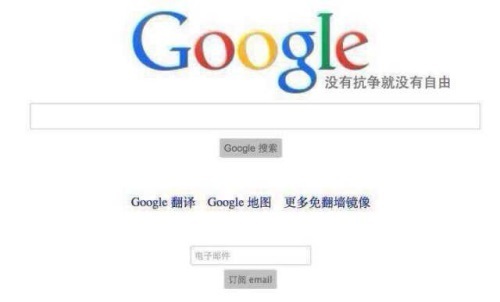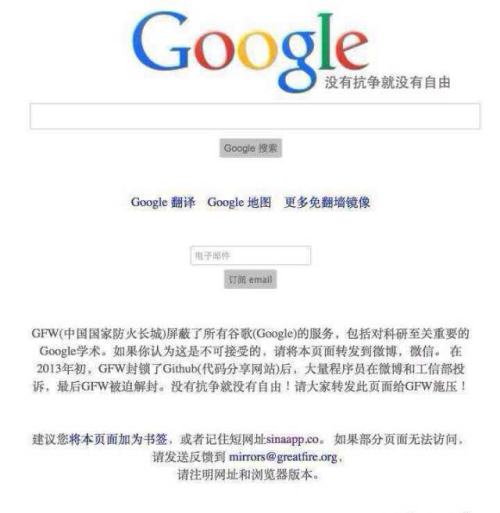
Memorial of flowers at Google’s headquarters in Beijing right before the company left China in 2010.
A Shenzhen man has taken the country’s second-largest telecom provider to court because it hasn’t been able to provide him with Google services after several months, reports Global Times.
Twenty-five year-old Wang Long has filed the first lawsuit of its kind against China Telecom after losing access to Gmail and Google. He noted that China Telecom has already admitted its inability to provide these services to him in court.
[I and China Unicom] have a contractual relation. They should offer me telecom services, yet they still failed to provide access [to these sites and services]. They should be held responsible for this failure.
A verdict is expected later this month.
Google pulled its servers out of China in 2010 instead of acquiescing to government demands to censor its search results.
But as an anonymous cyber security expert interviewed by Global Times points out, Wang’s anger is misdirected. The expert said:
China Unicom has nothing to do with the failure. It is Google that should be blamed, since it does not operate its business in China. I call on companies like Google or Twitter or Facebook to offer services in China and accept [proper supervision].
Photo: Epoch Times
]]> Going somewhere? For those of you along China’s east coast and getting ready to take a flight in the next few weeks, don’t raise your hand so fast.
Going somewhere? For those of you along China’s east coast and getting ready to take a flight in the next few weeks, don’t raise your hand so fast.
Asia Today reports the following twelve airports will experience delayed flights from July 20 until August 15: Shanghai Hongqiao, Shanghai Pudong, Nanjing, Hangzhou, Hefei, Jinan, Wuxi, Ningbo, Qingdao, Lianyun Harbor, Zhengzhou, and Wuhan.
In fact, civil authorities are asking airlines to reduce their total number of flights by 25% during this time period.
The military will apparently be conducting air drills, or “high frequency exercises”, during that period. All the same, the reasons behind the air space shutdown remain secretive. Internet users Ma from Beijing and Pei from Hainan were both arrested and charged for spreading rumors online, having said “said military exercises is just a decoy”. Thirty-seven other people were warned about spreading rumors, but not arrested.
Rumors aside, the number of delayed and canceled flights is not inconsequential. The Civil Aviation Administration of China said that 101 flights had been canceled at Shanghai Pudong International Airport by mid-day July 14, and 103 were delayed by more than two hours. Across the city over at Hongqiao Airport, 98 flights were canceled.
If there is a solution to this mysterious process that will inconvenience air passengers, it would be the readily-given suggestion to bypass the use of planes and use China’s high-speed railway system instead.
Photo: Shenzhen Police
]]>
 An image of a Google search page that is spreading like wildfire on Chinese social networks is openly encouraging Chinese internet users to protest against internet censorship in China.
An image of a Google search page that is spreading like wildfire on Chinese social networks is openly encouraging Chinese internet users to protest against internet censorship in China.
Google is not behind the campaign, however. It’s a campaign launched by GreatFire.org. It reads as follows [translated from Chinese]:
If there is no resistance, then there is no freedom
The GFW (The Great Firewall of China) screens and hides all services provided by Google including scientific research important to Google academics. If you feel that this is unacceptable, please forward this page on your Weibo and WeChat accounts. At the beginning of 2013 when the GFW closed off access to Github (code-sharing websites), a majority of programmers complained on Weibo and in work correspondence letters until finally the GFW was re-opened. If there is no resistance, there is no freedom! We request everyone to please forward this webpage to put pressure on the GFW!
We recommend that you please add this to your web browser bookmarks, or to please remember the URL address sinaapp.co. If there are some webpages that cannot be visited, then please send your feedback to [email protected] and please specify the URL and current version of web browser used.
Another similar version of this webpage can be seen here, and substitutes the URL address as 1kapp.co.
Google services were most recently targeted in China just before the anniversary of the Tiananmen Square incident, reports Bloomberg.
The company’s online presence has been censored in China since 2010 when it announced it would no longer comply with government regulations and redirected users to its Hong Kong site.
Correction: An initial version of this story claimed that Google was calling on Chinese people to fight the Great Firewall. That is incorrect. Google is not involved with this campaign in any way, to the best of our knowledge.
[h/t @missxq]
Photos: Google
]]>Two major developments have occured; the first is that wildly popular (especially among laowai) email provider Gmail has had intermittent service the last few days. Some users said they couldn’t access their Gmail accounts, others couldn’t send mail, and others couldn’t mark emails as unread. Google itself finally chimed in yesterday, as reported by the Guardian:
“Relating to Google there is no issue on our side. We have checked extensively. This is a government blockage carefully designed to look like the problem is with Gmail,” said a Google spokesman. China’s embassy in Washington was not immediately available for comment.
The announcement follows a blog posting from Google on 11 March in which the firm said it had “noticed some highly targeted and apparently politically motivated attacks against our users. We believe activists may have been a specific target.” The posting said the attacks were targeting a vulnerability in Microsoft’s Internet Explorer web browser. The two firms have been working to address the issue. At the time, Google declined to elaborate on which activists had been targeted or where the attacks had been coming from.
The second major development is that China is beginning to knock out access to VPNs, also known as Virtual Private Networks, or the precious tool that gives us access to Youtube. For those unfamiliar with VPNs, they effectively mask your computer’s IP address (the unique ID given to every device accessing the Internet) and gives it a generic IP address which appears to be from somewhere else, such as the United States. If your computer appears to be in the US, you get two benefits: you can see all the websites behind the Great Firewall, and also have access to US-only services such as Pandora, Hulu and Netflix. Right now, reports on Twitter indicate that Witopia, a popular VPN, and 12vpn are both inaccessible in Mainland China, however this can change minute-by-minute.
One VPN you can try (which still works, at least for me) is Strong VPN. (No, I’m not affiliated with them, although I did find out about them through a friend of mine’s blog.) It’s the best VPN I’ve used thus far, but also a bit pricey. But there are many to choose from, as you can see in this list.
It’s hard to gauge how long the crackdown will last. If I’m a betting man though, knowing how scared China is of any potential unrest, I wouldn’t expect to see Facebook or Twitter unblocked anytime soon, and we can only hope that Gmail will eventually be fully freed.
If you have other VPNs to recommend, please leave them in the comments below.
]]>